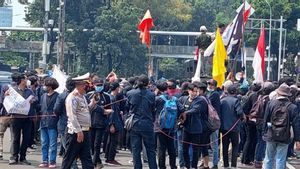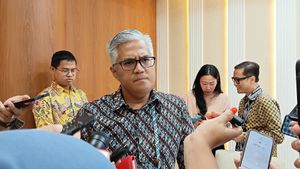JAKARTA - Lecturer of the Department of Communication, Faculty of Social and Political Sciences, University of Indonesia (FISIP UI), Ade Armando, strongly rejects the enforcement of Islamic law in Indonesia. The obligation to carry out Shari'a is actually dangerous for Indonesia itself.
Ade's statement refers to groups that are currently struggling to enforce Islamic law, including areas that use legal guidelines based on Islamic law.
"Of course it can be highly criticized, questioned, and refuted. You may disagree with me but I can also disagree with you and it is my duty to convey the view that the obligation for Muslims to enforce Islamic law is dangerous for Indonesia", said Ade quoted from a video uploaded on Youtube, CokroTV, Thursday, October 28
In the historical context, the enforcement of Islamic Shari'a in Indonesia has almost succeeded by including 'The Obligation to Implement Islamic Shari'a for its adherents.' However, this was rejected by the founding fathers, including Hatta.
Ade Armando departs from the definition of Islamic law which is currently being referred to by groups who want to enforce it.
According to him, Shari'a contains Islamic laws and regulations that regulate all aspects of human life, both Muslims and non-Muslims. In addition to containing the laws and rules of Islamic law, it also contains the resolution of problems throughout life.
Supporters of sharia believe that Islamic law is an integral or comprehensive and perfect guide to all problems of human life and the life of this world. they also believe that if Allah and His messenger have decided a case, then Muslims are not allowed to take other provisions.
"Muslims can only set their own laws if Allah and the Prophet Muhammad have not set their provisions on it. Sources can be from the Qur'an, the sayings and examples of the Prophet Muhammad, and the agreement of authoritative scholars in the early generations of Islamic history",
"Actually there is one other source, namely ijtihad, which is a genuine human effort to decide a case by using reason and careful consideration, but ijtihad can only be used regarding cases that have not been regulated in the Qur'an and hadith", said Ade.
SEE ALSO:
Those who truly believe in the supremacy of the Shari'a strongly believe that Muslims are obliged to carry out God's commands in all aspects of human life. What if the rules were enforced in the 21st century? According to Ade Armando, it will bring a lot of problems.
This is because the Qur'an and hadith can only be understood based on their historical context. In other words, many rules are irrelevant to our current condition. For example, about slavery.
The Qur'an states that a man does not need to guard his private parts with a female slave and this is then interpreted as permission for a man to sleep with his female slave without being in a marriage bond.
"So does this mean that a man can have sex without marrying his slave girl? Furthermore, does this mean that Allah allows a man to weigh a woman?", asked Ade.
If you read the Qur'an and use it as a reference, the answer is yes and yes. But the answer may change when the context in the verse is understood. That is, the verse comes in an episode where slavery was common and morally justified in 7th century Arabia. Slavery was natural for those who won the war.
Only for Ade, if the Qur'an is read in its entirety, the message is clear to reject slavery. Because there are so many verses that command Muslims to free slaves or humanely treat slaves.
Then explicitly about the thief whose ladder must be cut. Or a woman caught in adultery should be punished with 100 lashes. Including the provision not to make the disbelievers as your friends before they turn to the way of Allah.
"I want to say that understanding God's message cannot be just assuming what is forbidden and permitted or even commanded in the Qur'an and commanded by the prophet as a law that must be obeyed at all times and throughout the ages. Rules and laws depend on the context. If the context changes, the rules and laws change", said Ade.
The English, Chinese, Japanese, Arabic, and French versions are automatically generated by the AI. So there may still be inaccuracies in translating, please always see Indonesian as our main language. (system supported by DigitalSiber.id)















